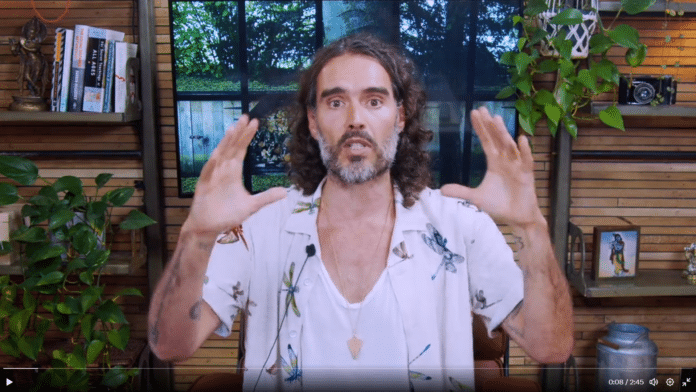Whether you love or hate Russell Brand, one thing is certain: He reveals uncomfortable truths for those who are not afraid of uncomfortable truths. He may get things wrong, but he certainly gets things right. While many are partisan and ignore the malevolence of their own side when attacking the other, Brand points out that both sides are the problem and both require serious maintenance or rebuilds. It is very hard for many who are conditioned to merely take sides to apply their imaginations or consciousnesses in an open way. However, to see reality and not the monochrome blur many want us to consume, we have no choice.
The corporate media pushes out of their rectums the monochrome blur every second and thus to think differently requires a very strong and astute will.
Before we turn back directly to Russell, let us ponder the narcissism of the corporate spew machine.
Corporate media has long been a subject of controversy and scrutiny, with accusations of bias, sensationalism, and manipulation of public opinion. While many argue that a free press is essential for a functioning democracy, concerns about the malevolence of corporate media persist.
- Ownership and Profit Motives
One of the primary concerns with corporate media is its ownership structure and profit-driven motives. In the pursuit of higher profits, media conglomerates often prioritise sensationalism over responsible journalism. This can lead to the creation of news stories that prioritise ratings and ad revenue over accuracy and impartiality.
Large corporations, which own many mainstream media outlets, may also use their influence to shape the narrative to protect their own interests. This can include biased reporting on issues related to corporate taxes, labour disputes, environmental regulations, and more. The focus on the bottom line can result in stories that are tilted towards corporate interests, potentially neglecting the public’s right to know.
- Political Bias and Partisanship
Another issue often associated with corporate media is political bias and partisanship. Many news outlets align with specific political ideologies or party affiliations. This bias can manifest in the way stories are framed, the selection of news topics, and the choice of experts and commentators who appear on their platforms.
In a polarised media landscape, viewers and readers may be exposed to news that confirms their existing beliefs, creating echo chambers and reinforcing political divisions. This can hinder meaningful public discourse and compromise the media’s role as a watchdog that holds those in power accountable.
- Sensationalism and Entertainment Value
Corporate media’s drive for higher ratings and viewership can lead to sensationalism and the prioritisation of entertainment value over substantive reporting. Stories that are more sensational are more likely to capture attention, which can translate into higher advertising revenue. As a result, news outlets may focus on celebrity gossip, crime stories, or sensationalised political scandals rather than in-depth reporting on important issues.
Sensationalism can have detrimental effects on public discourse, as it encourages superficial engagement with complex topics and distracts from pressing social and political concerns.
- Homogenization of News
The consolidation of media ownership has led to a homogenization of news content. A handful of powerful corporations control a significant portion of the media landscape, which can limit diversity in reporting and viewpoints. This concentration of media power can stifle investigative journalism and lead to a lack of critical analysis of important issues.
- Advertising Influence
Corporate media relies heavily on advertising revenue, which can compromise editorial independence. When advertisers exert influence over content, media outlets may avoid stories that could offend their advertisers or negatively impact their revenue. This can lead to a bias in favour of commercial interests, potentially suppressing coverage of issues that are critical to the public.
And for those who are still not convinced. Let me say two names.
Caroline Flack
and Jennifer Elliot
and then think hard before reaching a considered judgement on anyone the corporate media tells you to condemn. Always do the research with an open mind, or when anything bad happens, we are as guilty of their misery or deaths as the corporate dog turds that call themselves ‘journalists’.
People in the corporate media have their reasons for attacking Russell. Mostly, because he refuses to play by their rules and exposes them on a daily basis. It was, as Brand states, only a matter of time before they let loose the bully dogs, unmuzzled and very hungry for blood.
Whatever comes out, we know that the corporate media are silent about their own, and the truth has to be dragged kicking and screaming into the light when it is one of them. Spend some time asking, ‘why is that’?
Penny Lane
If you would like your interests… published, submit via https://dorseteye.com/submit-a-report/
Join us in helping to bring reality and decency back by SUBSCRIBING to our Youtube channel: https://www.youtube.com/channel/UCQ1Ll1ylCg8U19AhNl-NoTg and SUPPORTING US where you can: Award Winning Independent Citizen Media Needs Your Help. PLEASE SUPPORT US FOR JUST £2 A MONTH https://dorseteye.com/donate/







